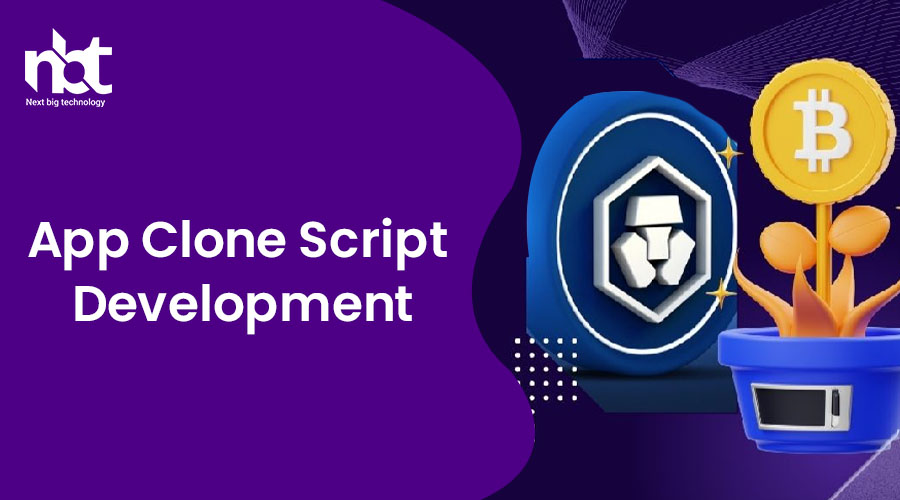Table of Contents
Introduction to App Clone Script Development
In the ever-evolving landscape of mobile applications, entrepreneurs are constantly seeking innovative and efficient ways to enter the market and establish a robust digital presence. App clone script development has emerged as a strategic solution, enabling businesses to leverage the success of existing applications while maintaining the flexibility to customize and brand their offerings. This comprehensive guide explores the depths of app clone script development, unraveling its intricacies, advantages, challenges, and the potential it holds for aspiring businesses.
The Genesis of App Clone Script Development
1.1 Definition and Scope: App clone script development involves creating a duplicate or replica of an existing mobile application’s source code. This innovative approach gained prominence as a means for entrepreneurs to fast-track their entry into the app market by building upon the success of established applications. The scope of app clone script development extends across various industries, including e-commerce, social networking, on-demand services, and more.
1.2 The Evolution of App Cloning: The concept of replicating successful models is not new, and app cloning draws inspiration from traditional business practices. However, the digital era has accelerated the pace at which new applications are developed and brought to market. App cloning serves as a response to the growing demand for quick and cost-effective solutions, enabling entrepreneurs to capitalize on proven success models.
The Mechanics of App Clone Script Development
2.1 The Cloning Process: Before embarking on the development journey, thorough research and analysis of the target application are imperative. Developers study the functionalities, user interface, and user experience of the original app to understand its core features and design elements.
2.2 Code Replication: Once the analysis phase is complete, developers create a new codebase from scratch. This involves replicating the essential features and functionalities identified during the research phase while ensuring that the new code complies with industry standards and best practices.
2.3 Customization: While the initial clone provides a foundation, entrepreneurs have the opportunity to customize the application to align with their brand identity. This includes incorporating unique features, design elements, and branding to differentiate the cloned app from the original.
The Advantages of App Clone Script Development
3.1 Time and Cost-Efficiency: One of the primary advantages of app clone script development is the significant time and cost savings it offers. Building an application from scratch is a resource-intensive process that demands extensive time and financial investments. App clones provide a shortcut to market entry by eliminating the need for foundational development, enabling businesses to focus on customization and user experience.
3.2 Proven Success Model: Replicating a successful application inherently carries the advantage of a proven success model. Popular applications have undergone rigorous market testing, user feedback, and iterations to achieve their current status. By cloning such an application, entrepreneurs can mitigate the risks associated with untested concepts and increase the likelihood of user acceptance.
3.3 Customization Opportunities: While the term “clone” may suggest identical replicas, app clone script development allows for extensive customization. Entrepreneurs have the flexibility to tailor the cloned app to suit their brand identity, target audience, and unique value propositions. This ensures that the final product is not merely a copy but a distinctive offering in its own right.
Key Concepts in App Clone Scripting
In the ever-evolving realm of technology, app clone scripting has emerged as a dynamic strategy for entrepreneurs looking to establish a presence in the competitive world of mobile applications. This article delves deeper into the key concepts that underpin app clone scripting, providing an in-depth understanding of its intricacies and implications for businesses.
1. The Genesis of App Clone Scripting
1.1 Definition and Evolution: App clone scripting involves the development of a duplicate or replica of an existing mobile application’s source code. The concept has evolved as a response to the demand for quicker and more cost-effective ways to bring innovative solutions to the market. As technology advances, so does the sophistication of app clone scripting methodologies.
1.2 Ethical Considerations: While app clone scripting offers undeniable advantages, ethical considerations come into play. Developers and entrepreneurs must navigate the fine line between inspiration and imitation. Understanding intellectual property laws and respecting the rights of original developers is crucial for ethical and legal app clone scripting.
2. Technical Aspects of App Clone Scripting
2.1 Reverse Engineering: Reverse engineering forms the backbone of app clone scripting. Developers dissect the functionalities, algorithms, and overall architecture of the target application. This process involves understanding the underlying code and structure to replicate the core features while ensuring compliance with legal and ethical standards.
2.2 Adaptability and Scalability: Successful app clone scripting goes beyond mere duplication. Developers must design clone scripts with adaptability and scalability in mind. This ensures that the cloned application can evolve independently, accommodating future updates, improvements, and unique features.
2.3 Cross-Platform Compatibility:To maximize the reach of a cloned application, cross-platform compatibility is essential. Developers need to consider variations in operating systems, screen sizes, and resolutions to create a seamless user experience across diverse devices.
3. Strategic Considerations for App Clone Scripting
3.1 Identifying Market Gaps: Before embarking on app clone scripting, entrepreneurs must conduct thorough market research to identify gaps or underserved niches. Cloning a successful app may be strategic, but customizing it to meet specific market needs enhances the chances of success.
3.2 Branding and Differentiation: While the cloned app provides a foundation, entrepreneurs must focus on branding and differentiation. Customizing the user interface, incorporating unique features, and establishing a distinct brand identity are critical aspects of successful app clone scripting.
3.3 Monetization Strategies:App clone scripting opens up various monetization avenues, from in-app purchases to subscription models. Entrepreneurs need to strategically plan their monetization strategies to ensure a sustainable and profitable business model.
4. Challenges and Solutions in App Clone Scripting
4.1 Legal Challenges: Navigating legal challenges, including copyright infringement and intellectual property disputes, is a significant hurdle in app clone scripting. Entrepreneurs must stay informed about relevant laws and work with legal professionals to ensure compliance.
4.2 Security Concerns: As cloned apps gain popularity, they become potential targets for cyber threats. Implementing robust security measures is imperative to protect user data and maintain the trust of the user base.
4.3 Market Saturation:The popularity of app clone scripting has led to market saturation in some niches. To overcome this challenge, entrepreneurs must focus on continuous innovation, offering unique features and a superior user experience.
5. App Clone Scripting and User Experience
5.1 User-Centric Design: A successful app clone script prioritizes user experience. Implementing a user-centric design ensures that the cloned application is intuitive, easy to navigate, and meets the expectations of the target audience.
5.2 Feedback Loops and Iterative Development: Creating a feedback loop with users and incorporating their suggestions into iterative development is crucial for the sustained success of app clone scripts. This agile approach allows for continuous improvement and keeps the application aligned with user preferences.
6. The Future Landscape of App Clone Scripting
6.1 Integration of Emerging Technologies: The future of app clone scripting lies in the integration of emerging technologies such as artificial intelligence, augmented reality, and blockchain. Incorporating these technologies into cloned applications can provide unique and innovative user experiences.
6.2 Regulatory Frameworks: As app clone scripting becomes more prevalent, regulatory frameworks may evolve to address ethical and legal considerations. Entrepreneurs must stay informed about regulatory changes and adapt their strategies accordingly.
6.3 Sustainable Development Practices: Sustainability in app clone scripting involves responsible coding practices, minimizing environmental impact, and promoting ethical business conduct. Sustainable development practices contribute to the long-term success and positive reputation of cloned applications.
Security Considerations in App Clone Scripting
Before we embark on the security journey, let’s establish a foundational understanding of app clone scripting. App clone scripts involve creating replicas of existing applications, enabling entrepreneurs to expedite the development process by leveraging pre-existing source code and functionalities. However, this convenience introduces a set of security challenges that need careful consideration.
Common Security Concerns in App Clone Scripting
1. Code Vulnerabilities: When utilizing existing source code, developers must be vigilant about potential code vulnerabilities that could compromise the security of the cloned application. These vulnerabilities may include outdated libraries, unpatched software, or even undiscovered bugs present in the original codebase.
2. Data Security and Privacy: Cloned applications often deal with sensitive user data. Ensuring the secure storage, transmission, and processing of this data is paramount. Inadequate data security measures can lead to data breaches, tarnishing the reputation of the cloned app and the business behind it.
3. Authentication and Authorization Risks: Authentication and authorization mechanisms are critical components of any application. Cloned apps must implement robust authentication processes to verify user identities securely. Failing to do so may result in unauthorized access, leading to data manipulation or theft.
4. Third-Party Integrations: Many applications rely on third-party APIs and services for enhanced functionality. When integrating such services into a cloned app, developers must ensure the security of these integrations. Insecure third-party components can introduce vulnerabilities that malicious actors may exploit.
5. Secure Communication Channels: The communication channels between the cloned app and its backend servers must be secure. Inadequate encryption or improper handling of data during transmission can expose sensitive information to eavesdropping or man-in-the-middle attacks.
6. Obfuscation and Code Protection: To protect the intellectual property embedded in the cloned app, developers often employ code obfuscation and protection techniques. However, relying solely on these measures may create a false sense of security, as determined attackers can still reverse engineer the code.
Best Practices for App Clone Scripting Security
Now that we’ve identified the potential security challenges, let’s explore best practices to mitigate these risks and ensure the security of app clone scripting.
1. Regular Code Audits and Updates: Regularly auditing the codebase for vulnerabilities and promptly addressing any issues is a fundamental security practice. Additionally, staying vigilant for updates in third-party libraries and promptly integrating them into the cloned app helps ensure the use of the latest security patches.
2. Data Encryption and Secure Storage: Implement robust encryption mechanisms to protect sensitive user data both during transmission and storage. Utilize industry-standard encryption protocols to safeguard data from unauthorized access. Secure storage practices, including proper key management, are equally crucial.
3. Multi-Factor Authentication (MFA): Enhance user authentication by implementing multi-factor authentication (MFA). MFA adds an extra layer of security by requiring users to provide multiple forms of identification, reducing the risk of unauthorized access even if login credentials are compromised.
4. API Security: When integrating third-party APIs, conduct thorough security assessments to ensure they adhere to best practices. Employ secure communication protocols (HTTPS), validate inputs, and implement proper error handling to fortify the integration against potential security threats.
5. Secure Communication Protocols: Utilize secure communication protocols, such as HTTPS, to protect data transmitted between the app and its servers. Encrypting communication channels mitigates the risk of data interception and manipulation by malicious entities.
6. Regular Security Training for Developers: Ensuring that developers are well-versed in security best practices is pivotal. Conduct regular security training sessions to educate the development team about the latest threats, secure coding practices, and the importance of maintaining a security-first mindset throughout the development lifecycle.
7. Implement Code Obfuscation and Protection Wisely: While code obfuscation and protection can deter casual reverse-engineering attempts, they are not foolproof. Supplement these measures with other security layers, and avoid relying solely on code obfuscation for robust security.
8. Incident Response and Monitoring: Establishing an incident response plan and implementing continuous monitoring are crucial for identifying and responding to security incidents promptly. Proactive monitoring can help detect unusual activities, signalling potential security threats before they escalate.
Steps in the App Clone Script Development Process
In the realm of mobile app development, the process of creating a successful app clone script goes beyond mere replication. While the fundamental steps involve studying, replicating, and customizing the source code of a popular app, there are additional crucial steps that developers need to consider for a seamless and effective development process. In this comprehensive guide, we’ll delve into these supplemental steps to ensure a thorough understanding of the app clone script development journey.
1. Market Research and Analysis: Before diving into the development process, it’s imperative to conduct thorough market research and analysis. Identify the target audience, understand their needs and preferences, and analyze the competition. This step helps in refining the features of the app clone script, ensuring it meets the specific requirements of the target market.
2. Legal Considerations: Understanding the legal aspects of app clone script development is crucial to avoid potential copyright and intellectual property issues. Ensure that the development process adheres to legal standards and regulations. Seek legal advice if necessary to navigate the complex landscape of intellectual property laws.
3. User Interface (UI) and User Experience (UX) Design: While the core functionalities may be replicated, the UI and UX design should be approached with a fresh perspective. Design an intuitive and user-friendly interface that aligns with the branding of the new app. Pay attention to user experience to ensure seamless navigation and engagement.
4. Choosing the Right Technology Stack: Selecting the appropriate technology stack is a critical decision in the app clone script development process. Consider factors such as scalability, performance, and future maintenance. Choose technologies that align with the specific requirements of the app and ensure compatibility with popular platforms.
5. Security Integration: Security is a paramount concern in the digital landscape. Integrate robust security measures to safeguard user data and protect against potential cyber threats. Implement encryption protocols, secure authentication methods, and regularly update security features to stay ahead of evolving security challenges.
6. Scalability Planning: Anticipate the future growth of the app and plan for scalability from the initial stages of development. This involves designing a flexible architecture that can accommodate increased user traffic, data volume, and additional features as the app gains popularity.
7. Quality Assurance and Testing: Rigorous testing is indispensable for delivering a reliable and bug-free app clone script. Conduct thorough testing across various devices, operating systems, and network conditions to identify and rectify any potential issues. Implement automated testing where applicable to streamline the testing process.
Future Outlook for App Clone Script Development
In the rapidly evolving landscape of technology, app clone script development is set to undergo transformative changes, shaping the future of the digital world. As we peer into the crystal ball of technological advancement, several key trends and possibilities emerge, painting a vivid picture of what the world of app cloning might look like in the not-so-distant future.
1. Advanced AI and Machine Learning Integration: The future of app clone script development is intrinsically linked to the evolution of artificial intelligence (AI) and machine learning (ML). As these technologies continue to advance, app clones will become smarter, more intuitive, and capable of adapting to user preferences seamlessly. AI-driven features, such as personalized recommendations, predictive analytics, and enhanced user interactions, will be integral to the success of app clones in the years to come.
2. Blockchain for Enhanced Security and Transparency: Security concerns have always been at the forefront of technological developments, and the future of app clone script development will not be an exception. Blockchain technology is poised to revolutionize the industry by providing enhanced security and transparency. Implementing blockchain in app clones can address issues related to data privacy, user authentication, and secure transactions, fostering trust among users and developers alike.
3. Cross-Platform Compatibility and Integration: The future of app clone script development will witness a heightened focus on cross-platform compatibility. As users increasingly demand seamless experiences across multiple devices, app clones will need to adapt. Developers will strive to create solutions that effortlessly transition between various platforms, ensuring a consistent and user-friendly experience, whether on mobile devices, tablets, or emerging technologies like augmented reality (AR) and virtual reality (VR).
4. Rapid Prototyping and Agile Development: The pace of technological change is accelerating, and so too must the development processes. Future app clone script development will likely embrace rapid prototyping and agile methodologies, allowing developers to quickly iterate and adapt to changing market dynamics. This agile approach will facilitate faster time-to-market, enabling businesses to stay ahead of the competition and respond swiftly to user feedback.
5. Augmented Reality (AR) and Virtual Reality (VR) Integration: The immersive experiences offered by AR and VR technologies are set to play a significant role in the future of app clone script development. As these technologies become more accessible, app clones will incorporate AR and VR features to enhance user engagement. Imagine trying out products virtually before making a purchase or exploring destinations through a travel app in a virtual environment – the possibilities are limitless.
6. Enhanced Personalization Through Big Data Analytics: The future of app clone scripts will be intricately tied to big data analytics, enabling unprecedented levels of personalization. Analyzing user behavior, preferences, and trends will empower app clones to deliver tailor-made experiences. From personalized content recommendations to individualized user interfaces, the integration of big data will take user personalization to new heights, making app clones more indispensable in users’ daily lives.
7. Voice-activated interfaces and Conversational AI: The rise of voice-activated interfaces and conversational AI is set to redefine user interactions with app clones. The future will likely see app clones integrating advanced voice recognition technology and conversational AI, allowing users to interact with applications through natural language. This shift towards more intuitive and conversational interfaces will enhance user convenience and accessibility.
8. Sustainability and Green Technologies: As environmental concerns take center stage, the future of app clone script development will witness a growing emphasis on sustainability. Developers will incorporate green technologies, optimize energy consumption, and implement eco-friendly practices in the app development lifecycle. This eco-conscious approach will not only contribute to a greener planet but also resonate positively with environmentally conscious users.
9. Global Collaboration and Remote Development Teams: The future of work is increasingly remote, and app clone script development is no exception. Global collaboration among diverse and remote development teams will become the norm. This shift will bring together talent from different parts of the world, fostering creativity and innovation. Collaborative tools and platforms will play a crucial role in enabling seamless communication and coordination among dispersed teams.
10. Legal and Ethical Considerations: With the evolution of app clone script development, legal and ethical considerations will become more pronounced. Stricter regulations surrounding intellectual property rights, data privacy, and ethical AI usage will shape the industry. Developers will need to navigate complex legal landscapes, ensuring compliance with international and local regulations to build and maintain trust with users.
Conclusion
The future of app clone script development holds immense promise, with technology poised to reshape the industry in ways we can only imagine. From advanced AI integration to blockchain security, cross-platform compatibility, and sustainable practices, the landscape of app clones will continue to evolve rapidly.
Thanks for reading our post “App Clone Script Development”. Please connect with us to learn more about App Clone Script.
















